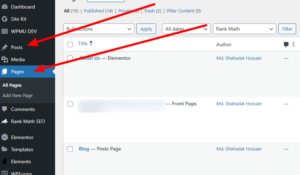A WordPress website uses pre-built tools and themes for easy customization, while a coding website is built from scratch, offering complete flexibility but requiring programming expertise.
Understanding the difference between WordPress and coding websites can help you make the right choice for your project. WordPress is a popular platform known for its user-friendly interface and pre-made themes. It enables you to create a website without deep coding knowledge.
On the other hand, coding websites require more technical skills. They offer greater flexibility and customization. This comparison will help you decide which option suits your needs best. Whether you are a beginner or an experienced developer, knowing the strengths and limitations of each can guide your decision. Let’s explore the differences between these two types of websites.
WordPress Website
A WordPress website is created using the WordPress content management system (CMS). It is popular for its ease of use, numerous themes and plugins, and wide customization options. This section will explore each of these aspects.
Ease Of Use
WordPress is known for its user-friendly interface. Even beginners can use it with ease. The dashboard is intuitive, making navigation simple. Creating posts and pages is straightforward. No coding skills are needed. This makes WordPress ideal for small business owners, bloggers, and non-developers.
Themes And Plugins
WordPress offers a vast collection of themes and plugins. Themes control the look of your site. You can choose from thousands of free and premium themes. Plugins add functionality to your website. Need an online store? Install a plugin. Want better SEO? There’s a plugin for that. Plugins and themes make it easy to customize your site.
| Aspect | Description |
|---|---|
| Themes | Control the appearance of your website. Available in free and premium versions. |
| Plugins | Add extra features to your site. Examples include SEO tools, e-commerce, and contact forms. |
Customization Options
WordPress offers extensive customization options. You can modify themes to fit your brand. The WordPress Customizer allows real-time edits. Change colors, fonts, and layouts with ease. Plugins provide additional customization features. Want a unique header? Use a header plugin. Need a custom footer? There’s a plugin for that too.
WordPress also supports custom code for developers. You can add custom CSS, HTML, or JavaScript. This provides flexibility for advanced users. WordPress is versatile, meeting the needs of both beginners and experts.
Coding Website
A coding website is built from scratch using programming languages such as HTML, CSS, JavaScript, and more. Unlike WordPress websites, coding websites offer a unique opportunity to create a completely customized web experience. Let’s explore some key aspects of coding websites:
Flexibility
Coding websites provide unmatched flexibility. You can design every element to your exact specifications. You aren’t limited by pre-designed themes or plugins. Instead, you create your own unique features and functionalities.
You can integrate any API, create custom animations, or develop complex forms. This level of customization allows for a truly unique website tailored to specific needs.
Performance And Speed
With a coding website, you have complete control over performance and speed. Optimizing every line of code ensures the website loads quickly. You can remove unnecessary elements that slow down the site.
A well-coded website often performs better than one built on a CMS like WordPress. It also provides a better user experience, which is crucial for retaining visitors.
Security
Security is a major advantage of coding websites. You can implement your own security measures, making it harder for hackers to exploit vulnerabilities. Unlike WordPress, which relies on third-party plugins, you control every aspect of your website’s security.
Regular updates and security patches can be applied as needed. This proactive approach keeps your website safe from potential threats.
Design And Development
The design and development of a website can take two main paths: using WordPress or coding a website from scratch. Both have unique advantages and challenges. Understanding these differences can help you choose the right path for your project.
Design Freedom
WordPress offers a large selection of themes and plugins. These allow users to customize their sites with ease. You can change colors, fonts, and layouts without knowing any code. But, this can be limiting if you need a very unique design.
Coding a website from scratch provides complete design freedom. You can create any layout or style you want. This is ideal for unique projects. But, it requires a deep understanding of design principles and coding languages like HTML, CSS, and JavaScript.
Development Time
WordPress is known for its quick setup. You can have a basic site up and running in minutes. Many themes are ready to use with just a few clicks. This saves a lot of time, especially for simple projects.
Custom-coded websites take longer to develop. Every element needs to be built from scratch. This includes design, functionality, and responsiveness. The development process can take weeks or even months. But, the result is a highly customized website.
Technical Skills Required
WordPress is user-friendly. Even beginners can create a professional-looking site. No coding skills are needed to start. Many tutorials and support forums are available to help you.
Building a website from scratch requires advanced technical skills. You need to know HTML, CSS, and JavaScript. Understanding backend languages like PHP or Python is also important. This path is best for experienced developers or those willing to learn coding.
Maintenance And Updates
Keeping your website running smoothly is crucial. Maintenance and updates are essential parts of this process. Whether you choose a WordPress site or a custom-coded site, each has its own maintenance requirements. Let’s explore the differences.
WordPress Maintenance
WordPress makes maintenance easier for most users. It offers automated updates for the core software, themes, and plugins. This ensures your site stays secure and up-to-date.
With WordPress, you can:
- Set up automatic updates for the core, themes, and plugins
- Use plugins to manage backups and security scans
- Get regular updates from the WordPress community
These features make it easier for non-technical users to maintain their websites. You can focus on content without worrying about technical issues.
Custom-coded Site Maintenance
Custom-coded sites require more hands-on maintenance. You need a developer to handle updates and fixes. This can be time-consuming and costly.
Here are some key tasks for maintaining a custom-coded site:
- Regularly update the core code and libraries
- Perform security checks and patch vulnerabilities
- Manage backups and restore points
- Optimize performance and fix bugs
Custom-coded sites offer more flexibility and control. But, they require more technical knowledge and ongoing effort.
Maintenance and updates are vital for any website. Choose the right option based on your technical skills and resources.
Cost Considerations
Cost considerations are crucial when choosing between a WordPress website and a coding website. Understanding the financial implications of each option helps you make an informed decision. Below, we break down the initial setup costs and long-term costs for both WordPress and coding websites.
Initial Setup Costs
The initial setup costs for a WordPress website are generally lower. You can start with a free theme and basic plugins. For a more professional look, purchasing a premium theme and additional plugins is advisable. Here is a simple table to illustrate the costs:
| Item | Cost |
|---|---|
| Domain Name | $10 – $15/year |
| Hosting | $3 – $10/month |
| Premium Theme | $30 – $100 (one-time) |
| Plugins | $0 – $50 (varies) |
For a coding website, the initial setup costs are higher. You may need to hire a web developer. Custom design, backend development, and additional features require significant investment. Here is a simple breakdown:
| Item | Cost |
|---|---|
| Domain Name | $10 – $15/year |
| Hosting | $5 – $20/month |
| Web Developer | $500 – $10,000 (one-time) |
| Custom Design | $200 – $5,000 (varies) |
Long-term Costs
The long-term costs of maintaining a WordPress website are generally lower. Regular updates, security plugins, and occasional theme changes are manageable. Here is a list of potential ongoing costs:
- Hosting: $3 – $10/month
- Premium Plugins: $0 – $50/year
- Theme Updates: $0 – $50/year
- Security: $0 – $100/year
For a coding website, long-term costs are higher. You need to budget for ongoing developer support and updates. Custom websites require more frequent maintenance. Below is a list of potential ongoing costs:
- Hosting: $5 – $20/month
- Developer Support: $50 – $200/hour
- Feature Updates: $200 – $1,000/year
- Security: $100 – $500/year
Comparing these costs helps you decide which option fits your budget. WordPress websites offer a more affordable starting point. Coding websites require a larger investment but provide more customization.
Seo And Performance
Understanding the differences in SEO and performance between a WordPress website and a coded website is crucial. Each has unique strengths and limitations. Let’s break it down.
Seo Capabilities
A WordPress website offers numerous plugins to enhance SEO. Popular plugins like Yoast SEO and All in One SEO Pack help optimize content effortlessly. These tools provide features such as:
- Keyword optimization
- Meta tags
- XML sitemaps
- Readability analysis
These plugins are beginner-friendly and constantly updated. They make it easier to keep up with SEO best practices.
On the other hand, a coded website requires manual optimization. You need to write clean HTML code and use proper tags. This approach can be more flexible but demands technical skills.
Performance Optimization
WordPress websites often rely on themes and plugins. While convenient, these can slow down the site. Too many plugins can increase load times.
To optimize performance, you can:
- Use a lightweight theme
- Limit the number of plugins
- Enable caching
- Compress images
WordPress also has tools like WP Rocket and W3 Total Cache to help with caching and speed.
A coded website can be optimized from the ground up. Developers can write efficient code and minimize HTTP requests. This often results in faster load times.
Here’s a quick comparison:
| WordPress | Coded Website | |
|---|---|---|
| SEO Tools | Plugins like Yoast SEO | Manual Optimization |
| Performance | Themes and Plugins | Custom Code |
| Ease of Use | Beginner-Friendly | Requires Technical Skills |
In summary, WordPress offers ease and plugins for SEO and performance. Coded websites provide flexibility and speed but need more technical expertise.
Scalability
When building a website, scalability is a crucial factor to consider. It determines how well your website can grow and handle increased traffic. Both WordPress websites and coding websites have different approaches to scalability. Understanding these differences can help you make an informed decision.
Handling Traffic
WordPress websites often rely on plugins and themes. These can help manage traffic efficiently. WordPress has caching plugins like W3 Total Cache. These plugins improve site performance under heavy load. Managed WordPress hosting services also offer scalability solutions. They can handle traffic spikes with ease.
Coding websites, on the other hand, offer more control. Developers can build custom solutions for traffic management. They can optimize the code for performance. This makes it easier to handle large volumes of traffic. A well-coded site can scale better with the right infrastructure.
Future Growth
WordPress websites are flexible. You can add new features using plugins. This makes it easy to expand the site’s functionality. But, too many plugins can slow down the site. Regular updates are also needed to ensure compatibility.
Coding websites provide more room for customization. Developers can build features from scratch. This allows for unique functionalities that suit your specific needs. Future growth is more streamlined and tailored. The code can be optimized for future demands.
| Aspect | WordPress Website | Coding Website |
|---|---|---|
| Handling Traffic | Uses plugins and managed hosting | Custom solutions and optimized code |
| Future Growth | Easy to add features with plugins | Custom-built features for specific needs |
Frequently Asked Questions
What Is A WordPress Website?
A WordPress website is built using the WordPress platform. It offers pre-designed themes and plugins, making website creation easy for non-developers.
What Is A Coding Website?
A coding website is built from scratch using programming languages like HTML, CSS, and JavaScript. It offers full customization and flexibility.
Which Is Better For Beginners?
WordPress is better for beginners. It provides user-friendly interfaces, pre-designed themes, and plugins, requiring no coding skills.
Which Offers More Customization?
A coding website offers more customization. Developers can tailor every aspect of the website to meet specific needs and preferences.
Conclusion
Choosing between a WordPress website and a coding website depends on your needs. WordPress offers simplicity and ease of use. It’s great for beginners. Coding websites provide full customization and flexibility. Ideal for developers. Consider your technical skills and project requirements.
Budget and time are also important factors. Both options have their unique benefits. Make an informed decision based on your goals.






